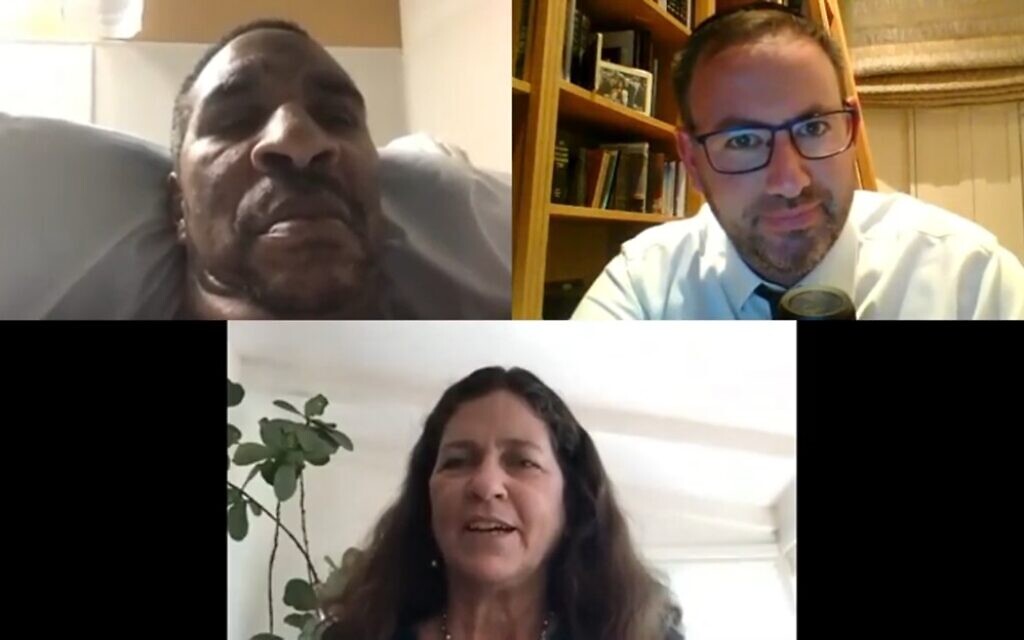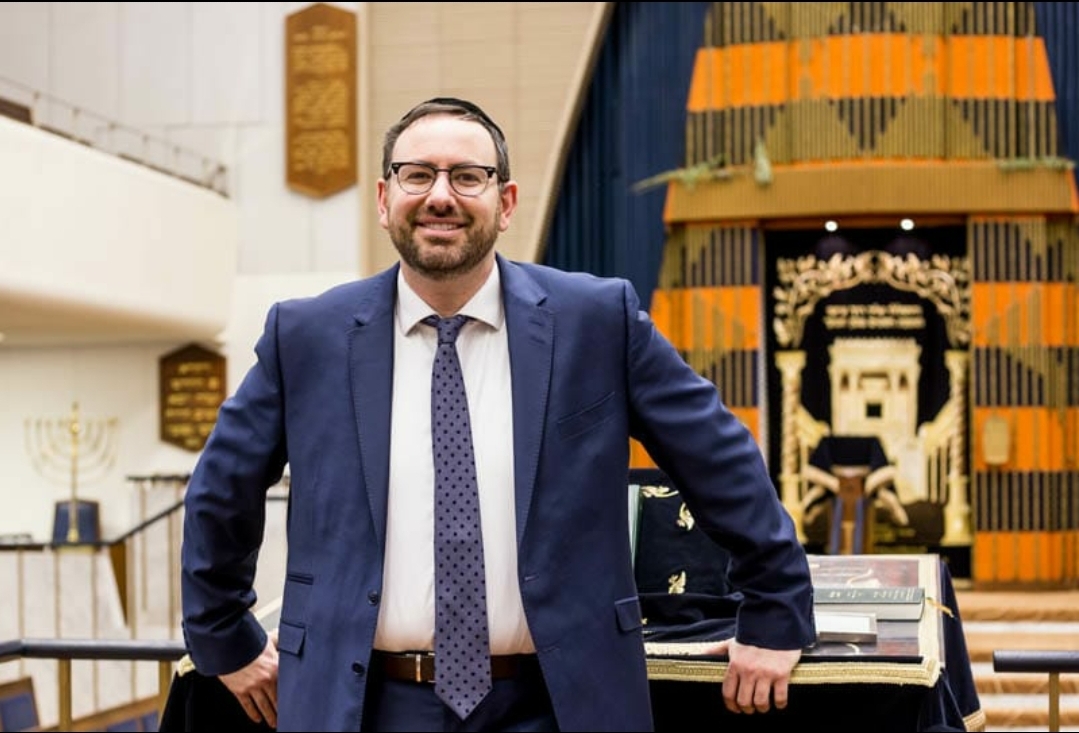In Yom Kippur video, UK rabbi interviews woman who forgave her brother’s killer
St John’s Wood's rabbi,Yoni Golker stresses power of forgiveness in conversation with Denise Taylor, whose brother was killed, and Ronnie Fields, who served 32 years for the crime

“What can I do,” Rabbi Yoni Golker thought, “to make Yom Kippur more meaningful for people?”
This year the St John’s Wood rabbi has come up with something almost guaranteed to resonate powerfully with his members and beyond.
It is a scarcely believable story of forgiveness, and ultimately some sort of redemption, the story of a woman who helped her brother’s murderer leave prison after more than 32 years.
Get The Jewish News Daily Edition by email and never miss our top stories Free Sign Up
Denise Taylor is a doctor who has spent much of her adult life working in men’s prisons in California. In 1984, in a marijuana deal which went tragically wrong, an African-American man called Ronnie Fields shot and killed her brother Jonathan, known as Bo.
He was given a minimum sentence of 27 years in prison, but in fact stayed in jail for just over 32 years — and was released in 2017 after Denise and her father, Jim, went to speak on his behalf at parole boards considering Fields’s case.

Now, in an extraordinary short film released on United Synagogue’s TV channel, USTV, Rabbi Golker has interviewed Ronnie Fields and Denise Taylor, with the themes of Yom Kippur, of personal forgiveness, at the forefront of the discussion.
The film was shown on Tuesday evening and its contents will form the basis of the Yom Kippur explanatory service at St John’s Wood next week.
Dr Taylor said that she had been inspired to make contact with Ronnie Fields after hearing a radio programme in which a woman whose parents had been killed had found their murderer, and offered her forgiveness.
She resolved to do the same and wrote to Fields in 2005, asking if he would let her visit him in prison. She said: “Working with the prisoners in the men’s jail made me understand how much such a visit would mean to them”. Dr Taylor became Ronnie Fields’ first visitor in 10 years, and she asked if she could visit again.
Ronnie Fields joins the discussion from a hospital bed in a rehabilitation clinic where he has been for the last 15 months. In what he tells Rabbi Golker he believes is “karma”, he says that he had a motorcycle accident less than a year after leaving prison, and lost an arm and a leg.
He talks about the circumstances of the murder, but tells Rabbi Golker and his audience that he is a “changed person”. He says that Dr Taylor’s approach “changed my life” and that he had pledged never to devastate another family the way he had devastated hers.
Dr Taylor says she believes that in allowing her access, Fields is “doing me a kindness”. She also says that she thinks everyone is forgivable. “We all have pettiness inside us”, she says, “but it is up to us how we respond”.
Rabbi Golker concludes the film with some thoughts about Jewish approaches to forgiveness and atonement. “There is a universal element to the story — whatever your faith or background, you can relate to it. It is a human story. The Jewish response is very clear: you can’t ask for forgiveness from a murder victim, because they are no longer there. But she — Dr Taylor — says she forgives Fields for what he has done, for herself, but also that he needs to forgive himself. And obviously, she’s unable to forgive him on behalf of her dead brother”.
Yom Kippur, says Rabbi Golker, is a time of asking forgiveness from God. “But the Mishnah teaches us that for sins between man and man, you need to seek out and ask forgiveness from that person, to evaluate what you did wrong. Sometimes it is not possible. But Yom Kippur is a day for rehabilitation and redemption, of second chances. This film shows the power of forgiveness, and that’s what I wanted people to think about.”

Thank you for helping to make Jewish News the leading source of news and opinion for the UK Jewish community. Today we're asking for your invaluable help to continue putting our community first in everything we do.
For as little as £5 a month you can help sustain the vital work we do in celebrating and standing up for Jewish life in Britain.
Jewish News holds our community together and keeps us connected. Like a synagogue, it’s where people turn to feel part of something bigger. It also proudly shows the rest of Britain the vibrancy and rich culture of modern Jewish life.
You can make a quick and easy one-off or monthly contribution of £5, £10, £20 or any other sum you’re comfortable with.
100% of your donation will help us continue celebrating our community, in all its dynamic diversity...
Engaging
Being a community platform means so much more than producing a newspaper and website. One of our proudest roles is media partnering with our invaluable charities to amplify the outstanding work they do to help us all.
Celebrating
There’s no shortage of oys in the world but Jewish News takes every opportunity to celebrate the joys too, through projects like Night of Heroes, 40 Under 40 and other compelling countdowns that make the community kvell with pride.
Pioneering
In the first collaboration between media outlets from different faiths, Jewish News worked with British Muslim TV and Church Times to produce a list of young activists leading the way on interfaith understanding.
Campaigning
Royal Mail issued a stamp honouring Holocaust hero Sir Nicholas Winton after a Jewish News campaign attracted more than 100,000 backers. Jewish Newsalso produces special editions of the paper highlighting pressing issues including mental health and Holocaust remembrance.
Easy access
In an age when news is readily accessible, Jewish News provides high-quality content free online and offline, removing any financial barriers to connecting people.
Voice of our community to wider society
The Jewish News team regularly appears on TV, radio and on the pages of the national press to comment on stories about the Jewish community. Easy access to the paper on the streets of London also means Jewish News provides an invaluable window into the community for the country at large.
We hope you agree all this is worth preserving.
-
By Brigit Grant
-
By Laurent Vaughan - Senior Associate (Bishop & Sewell Solicitors)
-
By Laurent Vaughan - Senior Associate (Bishop & Sewell Solicitors)
-
By Laurent Vaughan - Senior Associate (Bishop & Sewell Solicitors)
-
By Laurent Vaughan - Senior Associate (Bishop & Sewell Solicitors)





















